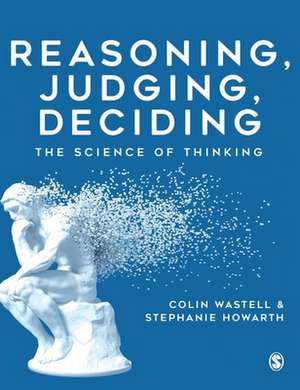Reasoning, Judging, Deciding: The Science of Thinking
Autor Colin Wastell, Stephanie Howarthen Limba Engleză Paperback – 17 noi 2021
| Toate formatele și edițiile | Preț | Express |
|---|---|---|
| Paperback (1) | 385.51 lei 3-5 săpt. | +58.43 lei 4-10 zile |
| SAGE Publications – 17 noi 2021 | 385.51 lei 3-5 săpt. | +58.43 lei 4-10 zile |
| Hardback (1) | 1028.97 lei 6-8 săpt. | |
| SAGE Publications – 17 noi 2021 | 1028.97 lei 6-8 săpt. |
Preț: 385.51 lei
Nou
Puncte Express: 578
Preț estimativ în valută:
73.78€ • 76.74$ • 60.91£
73.78€ • 76.74$ • 60.91£
Carte disponibilă
Livrare economică 25 martie-08 aprilie
Livrare express 08-14 martie pentru 68.42 lei
Preluare comenzi: 021 569.72.76
Specificații
ISBN-13: 9781526491077
ISBN-10: 1526491079
Pagini: 432
Dimensiuni: 186 x 232 x 30 mm
Greutate: 1.21 kg
Ediția:1
Editura: SAGE Publications
Colecția Sage Publications Ltd
Locul publicării:London, United Kingdom
ISBN-10: 1526491079
Pagini: 432
Dimensiuni: 186 x 232 x 30 mm
Greutate: 1.21 kg
Ediția:1
Editura: SAGE Publications
Colecția Sage Publications Ltd
Locul publicării:London, United Kingdom
Recenzii
"Thinking is the most fun you can have on your own, but we all do it differently. This book is an entertaining guide down the rabbit hole so that we can find out how we think about thinking and what we think about it. There is no doubt that this will help us understand not only ourselves but others too."
"A very engaging book that gives a comprehensive overview of the topics in thinking. I like in particular the theory centred approach endorsed, and that the authors show how arguments shape theories and how theories develop and progress over time."
"A very engaging book that gives a comprehensive overview of the topics in thinking. I like in particular the theory centred approach endorsed, and that the authors show how arguments shape theories and how theories develop and progress over time."
Cuprins
Chapter 1. Inheritors of the Enlightenment
Chapter 2. A Cognitive Revolution? When the mind began to matter!
Chapter 3. Thinking Under Uncertainty: Expected Utility Theory
Chapter 4. Prospect Theory: Heuristics and some biases
Chapter 5. Ecological Rationality: Are humans effective thinkers?
Chapter 6. Dual Process Models: Is the mind made up of two components?
Chapter 7. Mind: Modular and Extended: Is the mind made up of many components, internal and external?
Chapter 8. Deduction, Induction, Abduction: Reasoning formal and speculative
Chapter 9. Problem Solving Including Analogical Reasoning: Learning to answer the question that is asked!
Chapter 10. Imagination: The play space of the mind
Chapter 11. Nudge: Making good outcomes more common
Chapter 12. Expertise: How do experts think?
Chapter 13. Moral Reasoning: How do people decide on what is right?
Chapter 14. Cognitive Science of Religion: What can models of the mind tell us about belief in the supernatural?
Chapter 15. Artificial Intelligence: Computer thinking: What kind of thinking can computers really do?
Chapter 16. Argumentative Theory: Is the construction of arguments central to human thinking?
Chapter 17. Three Thinking Illusions: How much of our thinking is done alone?
Chapter 18. Thinking and Uncertainty: What effect does not knowing for certain have on our thinking?
Chapter 19. Thinking Scientifically: Easy or hard?
Chapter 20. Conspiratorial Thinking: Why are people so suspicious of governments and big business?
Chapter 21. Sceptical Thinking: How to avoid being duped by fake news!
Chapter 2. A Cognitive Revolution? When the mind began to matter!
Chapter 3. Thinking Under Uncertainty: Expected Utility Theory
Chapter 4. Prospect Theory: Heuristics and some biases
Chapter 5. Ecological Rationality: Are humans effective thinkers?
Chapter 6. Dual Process Models: Is the mind made up of two components?
Chapter 7. Mind: Modular and Extended: Is the mind made up of many components, internal and external?
Chapter 8. Deduction, Induction, Abduction: Reasoning formal and speculative
Chapter 9. Problem Solving Including Analogical Reasoning: Learning to answer the question that is asked!
Chapter 10. Imagination: The play space of the mind
Chapter 11. Nudge: Making good outcomes more common
Chapter 12. Expertise: How do experts think?
Chapter 13. Moral Reasoning: How do people decide on what is right?
Chapter 14. Cognitive Science of Religion: What can models of the mind tell us about belief in the supernatural?
Chapter 15. Artificial Intelligence: Computer thinking: What kind of thinking can computers really do?
Chapter 16. Argumentative Theory: Is the construction of arguments central to human thinking?
Chapter 17. Three Thinking Illusions: How much of our thinking is done alone?
Chapter 18. Thinking and Uncertainty: What effect does not knowing for certain have on our thinking?
Chapter 19. Thinking Scientifically: Easy or hard?
Chapter 20. Conspiratorial Thinking: Why are people so suspicious of governments and big business?
Chapter 21. Sceptical Thinking: How to avoid being duped by fake news!
Notă biografică
Dr Colin Wastell has been teaching and researching in the area of human thinking for the past 15 years. His interests in the field are diverse. He has published on the concept of the modularity of the mind as well as the thinking processes that underly belief in the supernatural.
Descriere
Wastell & Howarth’s text clearly, accessibly and comprehensibly introduces the core theories of Thinking, leaving no stone unturned, students will receive an in-depth coverage of the theoretical side of this subject area before the authors delve into a more practical understanding of the topic.
